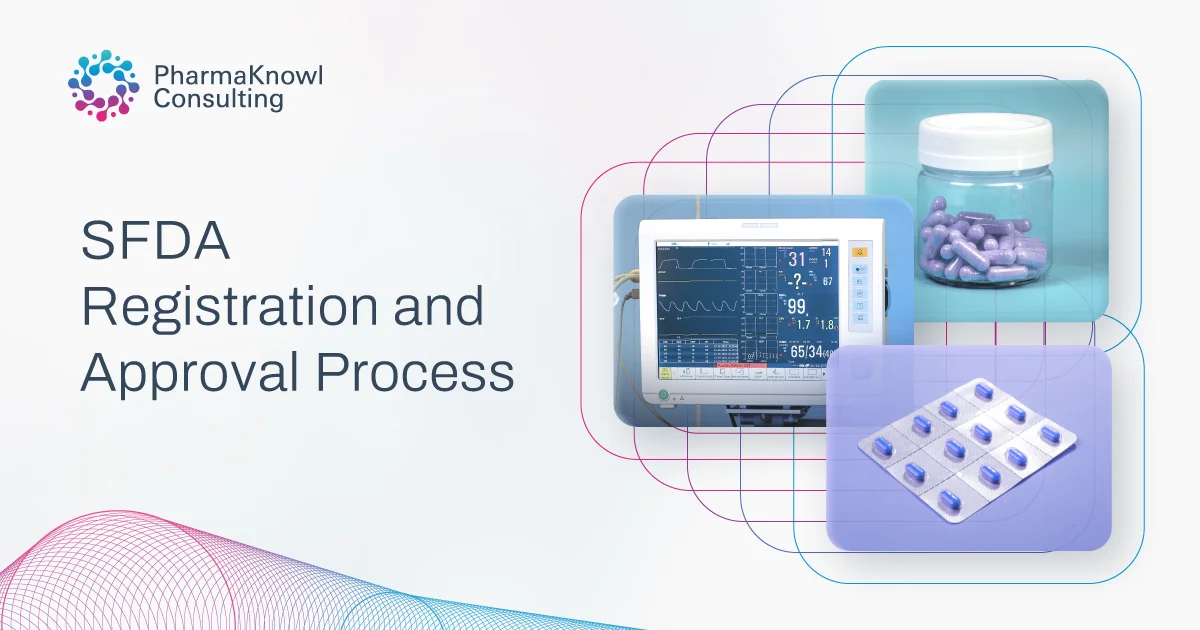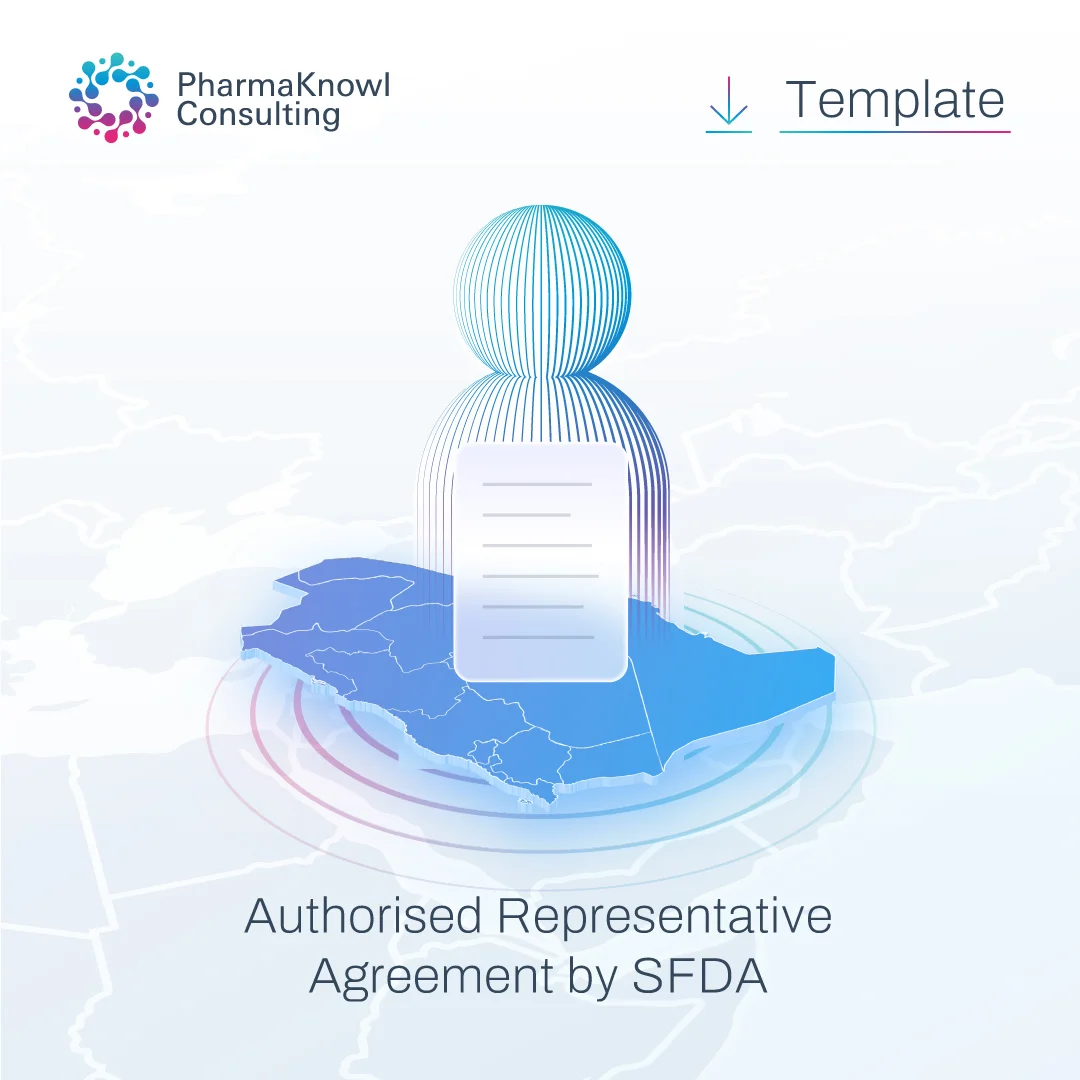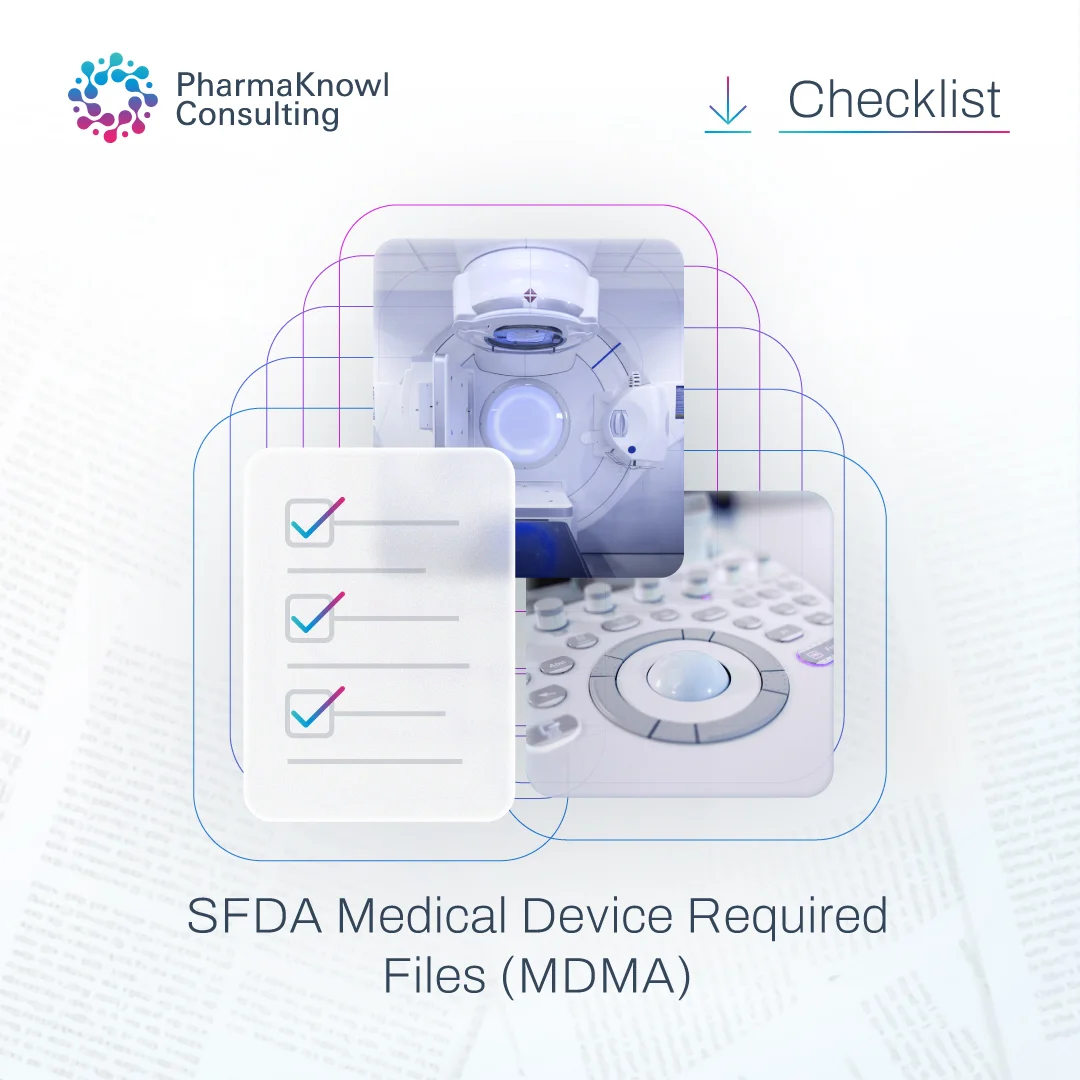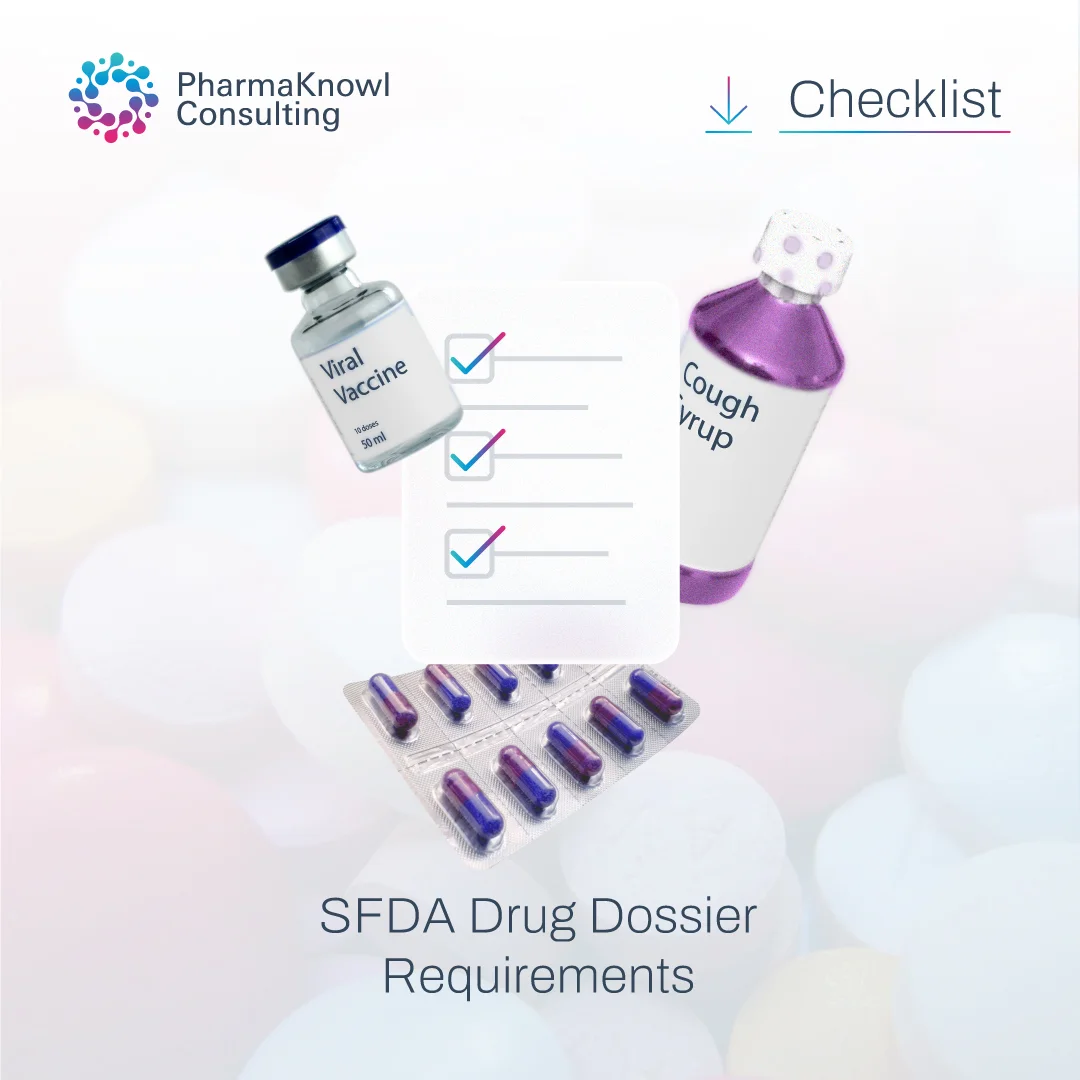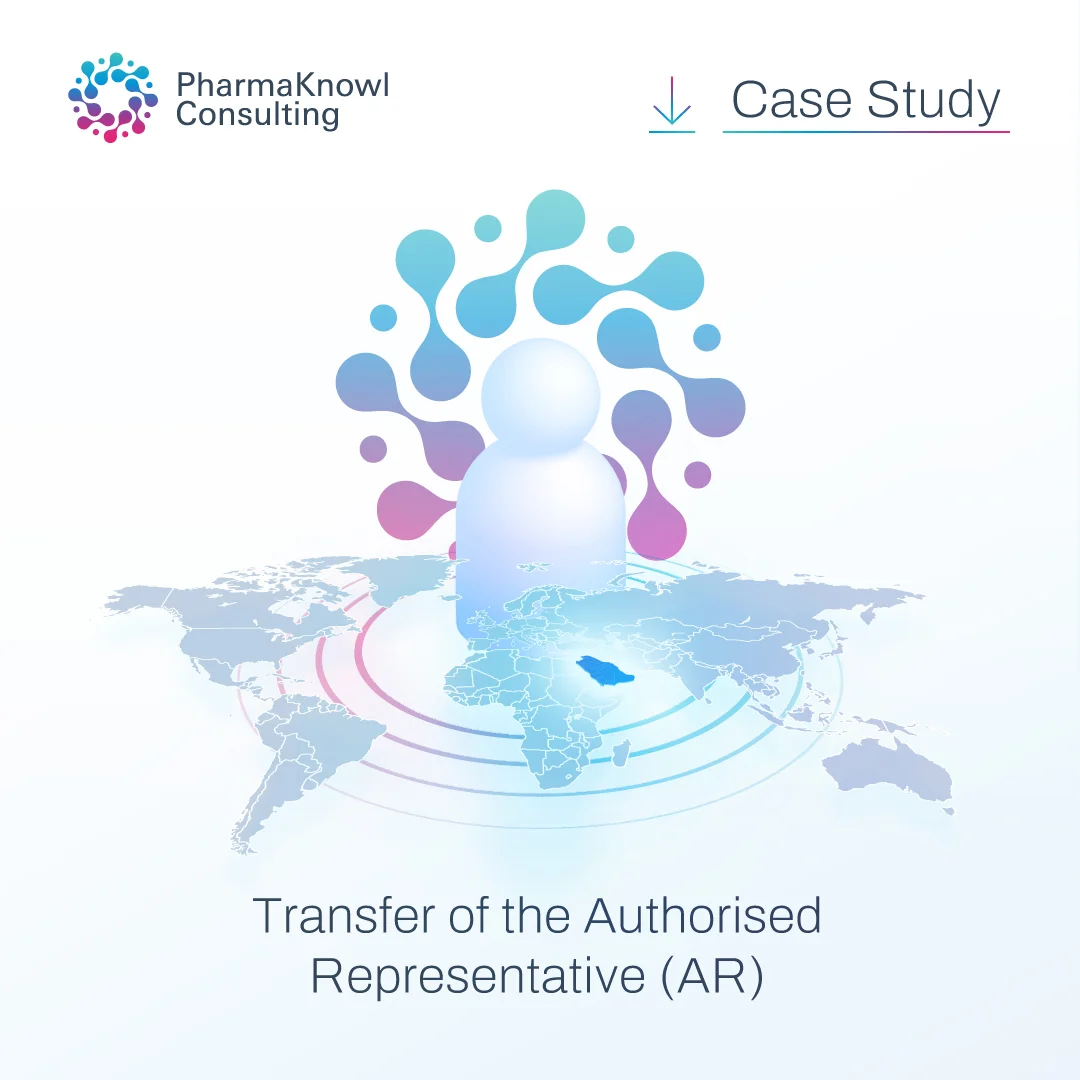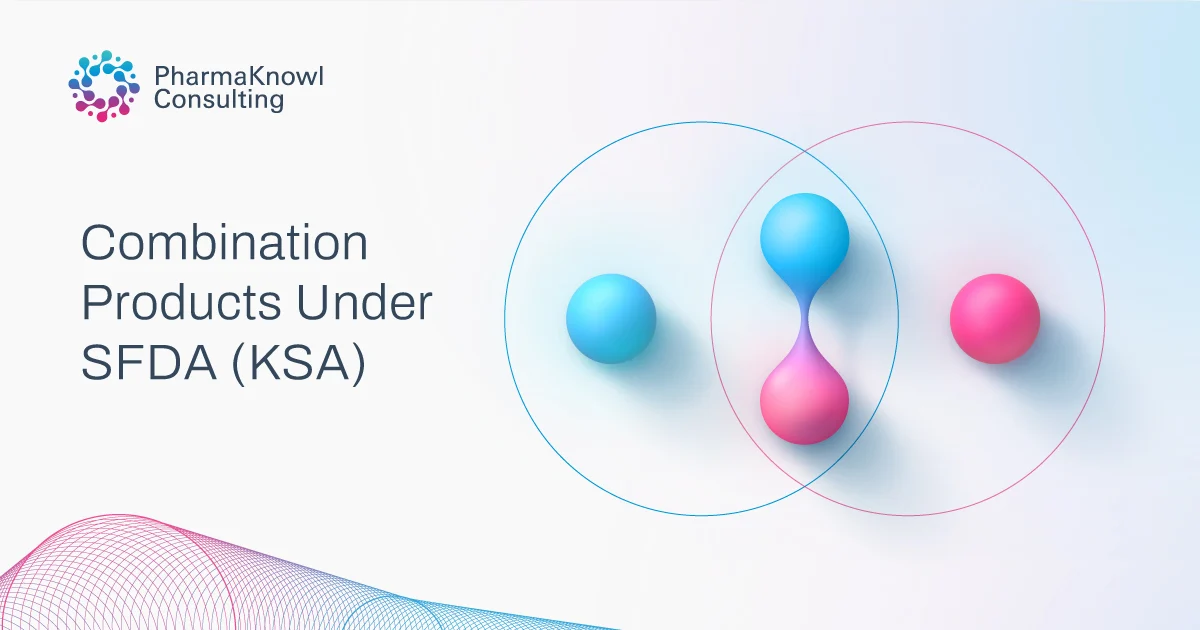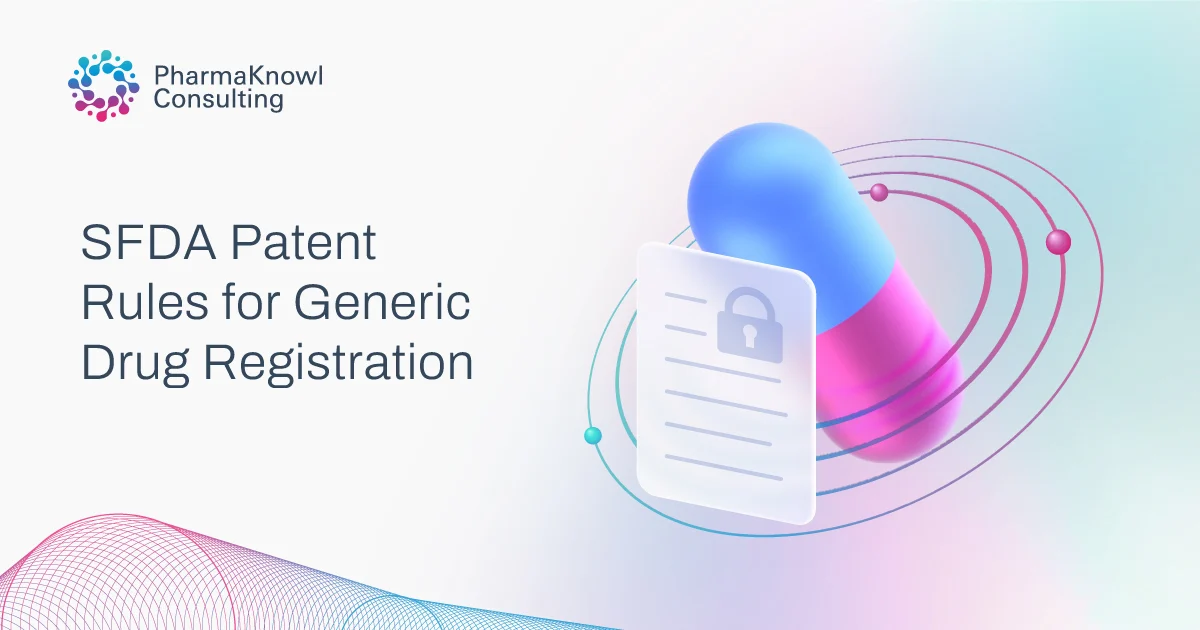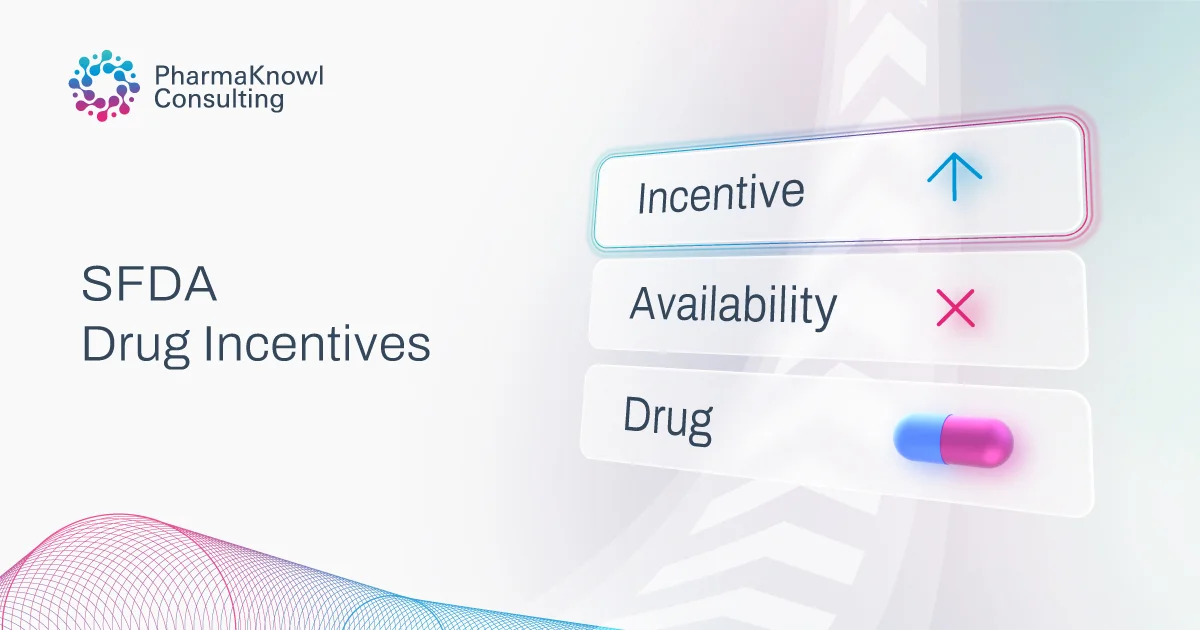In Saudi Arabia, the Saudi Food and Drug Authority (SFDA) regulates the life sciences industries, ensuring that products meet stringent safety, efficacy, and quality standards. The regulated products include pharmaceuticals, biotechnology, medical devices, herbal products, nutraceuticals, cosmetics, food and supplements, as well as veterinary and animal health feeds.
All companies seeking to market their products in Saudi Arabia must complete the SFDA registration process. Upon successful review, the company will receive an SFDA certificate confirming the product’s approval status.
In this post, we will clarify:
- How to register your products?
- Who can apply?
- What are the SFDA registration requirements?
- How can PharmaKnowl assist you?
Table of contents
About the SFDA
The Saudi Food and Drug Authority (SFDA) oversees human and animal products to safeguard the public from harmful, substandard, falsely advertised, counterfeit, or ineffective products. Its core mandate is to ensure product safety, efficacy, and quality.
Among regulatory bodies in the MENA region, the Saudi FDA stands out as the most stringent, driven by ongoing advancements in Saudi pharmaceutical laws and the growing expertise of local scientists since its inception in 2004.
This progress reached a significant milestone in 2021 when the Saudi authority became a full regulatory member of the International Council for Harmonisation of Technical Requirements for Pharmaceuticals for Human Use (ICH).
Furthermore, the SFDA achieved WHO Maturity Level 4, an acknowledgement reserved for national regulatory authorities that demonstrate a high level of regulatory performance and a commitment to continuous improvement.
As a result, many Gulf Cooperation Council (GCC) and Middle East and North Africa (MENA) countries consider Saudi Arabia a key reference country (although not officially).
SFDA Regulations
The SFDA regulates different industries under its three main sectors: Food, Drug, and Medical Devices. Each sector encompasses multiple registration procedures for a range of healthcare products, as follows:
- Food Sector: simple food, dietary supplements, pesticides, animal feeds, and feed additives.
- Drug Sector: innovative drugs, generics, health products, biocides, herbal products, veterinary medicines, animal health products, and cosmetics.
- Medical Devices: All medical technology (MedTech) products, equipment, and supplies.
Beyond product approvals, the SFDA also regulates, inspects, and licenses entities such as:
- Marketing Authorisation Holders (MAH)
- Manufacturers
- Warehouses
- Consulting firms
- Might extend to brand owners, license holders, and suppliers of raw materials and active pharmaceutical substances (APIs).
Companies Eligible to Apply to the SFDA
Local regulations permit specific legal entities to submit applications to the Saudi FDA. The following are the available options for local and international companies.
Local Companies
Local Saudi companies can submit their applications directly to the SFDA, provided they hold the appropriate licenses for the relevant activity and have access to the relevant electronic systems.
International Companies
International companies can submit to the SFDA through one of the following entities:
Legal Entity (Independent SFDA Account)
To establish a local legal entity in Saudi Arabia as a foreign investment firm through the Ministry of Investment (MISA). This option could be feasible for multinational companies with well-established experience in the Saudi market.
Scientific Office (Independent SFDA Account)
International companies can establish a scientific office to enable direct submissions to the SFDA (pharmaceuticals only).
Local Distributors (Shared SFDA Account)
Local distributors can apply on behalf of the international companies. While it is cost-effective, it often falls short in critical areas such as confidentiality, regulatory expertise, dedication, and strategic alignment. All of these factors might lead to conflicts of interest, longer timelines, and a complex regulatory journey.
Consulting Company (Independent SFDA Account)
The SFDA allows international Pharma, Biotech, and MedTech companies to register new products in their own SFDA electronic accounts independently while continuing to conduct commercial operations through their local distributors. Here are a few essential points about this option:
- Creation: SFDA-approved local consulting firms can establish the international SFDA account to split regulatory functions from distributors.
- Process: Under this account, the global company can register new products and transfer their approved applications from the distributors’ account to theirs while keeping the distributors appointed.
- Obligation: This approach does not oblige the global company to establish a legal presence in the market.
- Benefits: In return, it offers a range of benefits over the reliance on distributor regulatory support, including:
- Independent: A dedicated private SFDA electronic account.
- Professional Regulatory: Utilize experienced consultants to work on the applications and officially represent the international company to help navigate complex regulations.
- SFDA Communication: High-level SFDA accessibility and professional engagement.
- Control and Oversight: Retain power over licenses and the ability to change appointed distributors.
- Confidentiality: Maintain strict data privacy and confidentiality of proprietary information.
- Accelerated Market Entry: Enables faster submissions to the SFDA while searching for and negotiating with potential commercial partners in a stronger position.
SFDA Approval
The SFDA approval process takes place within the authority and involves a comprehensive scientific and regulatory review to ensure products are safe and effective for public use. This stringent evaluation is conducted for highly regulated product categories and may vary depending on the type of application and submission pathway within the relevant department of the authority.
Once the application reaches the regulatory department, the relevant sections of the file are distributed to related assessors. Each assessor evaluates the submitted information against the applicable SFDA standards and compiles a report outlining comments and deficiencies.
Then, the SFDA product manager consolidates any feedback and sends it to the applicant as an “SFDA Inquiry” or “Request for Information” (RFI).
Certain products, such as pharmaceuticals, undergo additional layers of scrutiny. These can include departmental meetings, laboratory testing, Good Manufacturing Practice (GMP) inspections, pricing committee evaluations, and final approval by the central drug committee.
Ultimately, the SFDA approves the product once the assessors have verified that all standards and requirements have been met, confirming its eligibility for the Saudi Arabian market.
The review time varies according to the procedure type, the number of deficiencies, the frequency and complexity of RFIs, and the applicant’s responsiveness.
SFDA Registration
The term SFDA Registration can be applied broadly, encompassing even basic listings of products and facilities in the SFDA database. In contrast, SFDA Approval or Authorisation typically refers to more stringent regulatory reviews required for highly regulated products, such as pharmaceuticals and medical devices.
For example, the SFDA handles specific products, such as simple food items and cosmetics, differently under the “Notification” or “Listing” procedures, in which the authority does not conduct a full review and the applicant is responsible for ensuring product compliance.
In contrast, the majority of other product categories must undergo a thorough scientific and technical assessment before being granted a marketing authorisation (MA). Such as pharma, biotech, and medtech products. Where even their manufacturers and other facilities may be evaluated and, in some cases, inspected on-site.
Upon the end of the evaluation, the authority lists the product in the SFDA database and issues an SFDA certificate confirming its marketing eligibility in the country.
Product Registration
Pharmaceuticals
The Saudi FDA’s drug sector publishes related guidelines, assesses drug registration applications, and issues marketing approvals and licenses. It publishes the registration requirements for chemical entities, biologicals, biosimilars, radiopharmaceuticals, health products, herbal products, generics, and veterinary drugs.
The SFDA links the drug marketing authorisation (MA) to three entities:
- The Marketing Authorisation Holder (MAH)
– MAH is the owner of the MA in Saudi Arabia.
– MAH must be a manufacturing company (with a few exceptions).
– MAH can change or add distributors and manufacturers at any time.
– MAH is always an international or local manufacturer, never a distributor or a consulting company.
– MAHs should keep MAs under their SFDA account, not with distributors. - The Manufacturer
One or more manufacturers are allowed. - The Distributor
One or more distributors are allowed.
The drug applications come in several types, as follows:
Human Drug Products
This application includes various drug types, including new chemical entities (NCEs), known active substances, biologicals, biosimilars, radiopharmaceuticals, and generics. In addition, this application can go through one or more of the following standard or expedited pathways and designations:
- Standard Drug Registration Procedure
- Priority Review Procedure
- Abridged and Verification Procedures
- Conditional Approval Procedure
- Breakthrough Medicine Procedure
- Orphan Drug Designation (ODD)
- Well Established Use (WEU)
For more related drug regulatory posts, read:
Herbal and Health Products
Companies must register herbal and health products under the drug sector, which requires a CTD or eCTD file for registration.
Veterinary Drug Products
This application includes new veterinary drugs, biologicals, generics, herbal products, and animal health products. The application can go through one or more of the following procedures:
- Veterinary Drug Registration (Regular pathway)
- Abridged and Verification Procedures
- Priority Pathway
Medical Devices
Medical device regulations in Saudi Arabia evolve rapidly, keeping pace with global advancements. The SFDA is the region’s most stringent authority regarding medical device registration requirements and the depth of technical file evaluation. (Download: Checklist: SFDA Medical Device Required Files – MDMA)
Below are two recent, noteworthy regulatory updates in Saudi Arabia:
- January 2022
Companies must submit a comprehensive Technical File Application (TFA) for devices in all risk classes, which is similar to the EU Medical Device Regulations (MDR). - September 2022
The SFDA unified the requirements for all risk classes, making the appointment of an authorised representative mandatory for low-risk devices.
Cosmetics
Companies must register their cosmetic products before marketing them in the Saudi Arabian market. Unlike other product categories, the cosmetics registration process follows a “Notification Procedure.”
In this procedure, the SFDA does not necessarily review the submitted data; it will list the product in its database even if it does not fully meet the applicable cosmetic standards at the time of listing. Consequently, the applicant must ensure the product complies with all relevant standards before applying.
After listing the cosmetic product, SFDA conducts compliance checks both in the marketplace and, most notably, at the port of entry. During this inspection, SFDA officers verify product labels on every incoming shipment and request a Certificate of Conformity (CoC) for each batch. If a product fails these checks, the SFDA might reject the shipment at the border or recall it if the company has already marketed it.
To avoid such complications, it is crucial that all submitted documentation and product attributes strictly adhere to the Saudi and GSO standards throughout the entire submission and importing process.
Food
Food registration requirements are generally simpler than those for other product categories. Nonetheless, the SFDA still requires that the ingredients, labels, manufacturers, and raw material sources meet all relevant regulations and GSO (GCC) standards.
While the SFDA does not conduct a comprehensive label review at the time of registration, it trusts the applicant to ensure compliance. The SFDA’s primary evaluation occurs at the port of entry, where labels and documentation are inspected to verify compliance with requirements, such as batch analysis from approved labs or halal certificates.
Food Supplements
Food supplements can be classified as food, health, or herbal products according to their ingredients and medical claims. A product classified as a food product must be registered using the distributor’s account.
In contrast, supplements categorised as health or herbal products can be registered directly with the SFDA, either through a consulting firm or via a distributor.
Sanitisers and Disinfectants (Biocides)
The SFDA oversees the registration of biocides, including sanitizers and disinfectants. The classification depends on their intended use:
- Biocides for Human Use: Classified as health products.
- Biocides for Medical Instrument Use: Considered medical devices.
Determining the correct pathway often requires input from a subject matter expert who can advise on potential adjustments to the applicable process.
Biocides not intended for human use are regulated by the Saudi Standards, Metrology, and Quality Organisation (SASO) or the Ministry of Agriculture (Naama Platform). These products may require a certificate of conformity.
Feed Additives
Registering animal feed additives (also referred to as fodder or forage) can vary in complexity based on ingredient composition and product claims. While standard approvals typically take two to four weeks, more complex products may require several months due to the need for scientific committee evaluations in the SFDA food sector.
Tobacco and Nicotine Products
In May 2015, a royal decree made the SFDA the official regulatory body for tobacco in Saudi Arabia. It became responsible for tobacco standardisation, clearance approval, and entity licensing. It also monitors the components and emissions of tobacco & nicotine products.
The current Tobacco Regulations are:
- Standards
SFDA applies the Gulf (GCC/GSO) standards concerning specifications and components. - Packaging
Plain packaging for cigarettes is enforced. - Electronic Cigarettes
The authority has issued specific requirements and standards for e-cigarettes, heated tobacco products, and other related devices. - Licensing
Local distributors must obtain a special license to import and commercialise tobacco in Saudi Arabia.
Manufacturer Registration
In this section, we will discuss various types of manufacturers and whether they are required to register with the SFDA or undergo a less stringent compliance check.
Pharmaceutical Manufacturer
Pharmaceutical manufacturer registration is required for sites that produce drugs, biotechnology products, health products, and herbal products. These sites are subject to mandatory inspection and payment of fees. For more, read GMP inspection.
Food Manufacturer
Only poultry, dairy, and fish product manufacturers, including their related slaughterhouses and suppliers, are subject to registration and possible inspection.
Medical Device Manufacturer
The need for inspection and registration applies to local medical device manufacturers and, in some cases, to international facilities.
Other Products Manufacturers
Other types of product manufacturers are not required to be inspected. They must submit a manufacturer license (ML) and other qualifications, such as ISO certifications and related audit reports.
Warehouse Registration
Local Saudi warehouses must obtain an SFDA license before commencing their activities. The SFDA must license every commercial activity in the commercial record that the authority regulates. The warehouse needs to apply good distribution practice (GDP), an ISO-certified quality management system (QMS), and other relevant requirements.
Distributor Registration
The distribution license is nearly identical to the warehouse license. Adding importation activity is a must in addition to opening the required distributor accounts.
Timelines
The registration timelines depend on the application type; see our post SFDA Timelines for details.
Fees
Government fees range from no charge for cosmetics to as little as $267 for product classification, to as high as $49,066.60 for a drug manufacturer registration. For more details, read the SFDA Fees.
SFDA Certificate
A governmental document issued by the SFDA indicates that a company or product is registered or has been granted approval or authorization for marketing in Saudi Arabia. This certificate is issued upon completion of the registration process. It gives the green light to manufacture and market products and to clear imported product shipments at Saudi ports.
The image below is the header of an SFDA certificate.
It is by applying the required standards and complying with the SFDA requirements. To learn more about the process, refer to the related product type in this article.
Regulatory Consulting and Services
At PharmaKnowl Consulting, we provide life science companies with the following services:
SFDA Registration Services
Securing SFDA approval for your products is at the heart of what we do. Our dedicated Riyadh-based pharmacists and biotechnologists can seamlessly integrate with your organisation and provide expert regulatory services and guidance.
Local Agent and Representation
International companies can appoint PharmaKnowl as a non-commercial local agent (for pharmaceutical products) or an authorised representative (for medical devices), thereby gaining access to professional regulatory support, streamlined meetings with the SFDA, and expert guidance. This approach lets you maintain distributor relationships while benefiting from dedicated regulatory expertise.
Clinical Research
Our Clinical Research Organization (CRO) department offers comprehensive clinical research services, including clinical trials, research, special access program (SAP), and more.
Regulatory Project Management
Our regulatory project management services ensure seamless compliance with Saudi regulations. We successfully manage projects such as MA transfer (MAT), Technology Transfers, licensing, local manufacturing, and more.
Life cycle management
Our life cycle management (LCM) services ensure compliance for marketed products and maintain a continuous supply. Companies can outsource all their LCM operations to our team.
Regulatory intelligence
Our regulatory intelligence service provides comprehensive insights into the latest SFDA regulatory requirements and updates in Saudi Arabia. We help you stay ahead of compliance changes and navigate complex regulatory landscapes efficiently.
Pharmacovigilance
Our pharmacovigilance services in Saudi Arabia ensure compliance with SFDA regulations and provide full PV coverage by Saudi QPPVs.
For more information, Contact Us.
About the Author
Regulatory consultant with +20 years of experience working for the SFDA, multinational companies, and as a consultant in PharmaKnowl. LinkedIn
Resources
Services
Events
